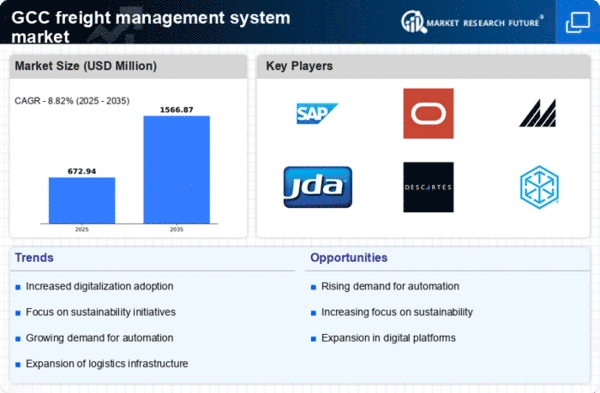E-commerce Growth
The rapid expansion of e-commerce in the GCC region is a pivotal driver for the freight management-system market. As online shopping continues to gain traction, logistics and supply chain operations must adapt to meet the increasing demand for efficient delivery services. In 2025, e-commerce sales in the GCC are projected to reach approximately $30 billion, necessitating advanced freight management solutions to streamline operations. This growth compels businesses to invest in sophisticated systems that enhance visibility, reduce costs, and improve customer satisfaction. Consequently, the freight management-system market is likely to experience heightened demand as companies seek to optimize their logistics processes to keep pace with the evolving retail landscape.
Digital Transformation
The digital transformation sweeping across various industries in the GCC is a crucial driver for the freight management-system market. Companies are increasingly adopting digital tools and technologies to enhance operational efficiency and data-driven decision-making. In 2025, it is estimated that around 70% of logistics companies in the region will implement digital solutions to optimize their supply chains. This shift towards digitization necessitates the integration of advanced freight management systems that can provide real-time tracking, analytics, and automation. As businesses strive to remain competitive in a rapidly evolving market, the demand for innovative freight management solutions is expected to rise, further propelling market growth.
Rising Trade Activities
The GCC region is witnessing a surge in trade activities, which is significantly impacting the freight management-system market. The establishment of free trade agreements and economic diversification initiatives has led to increased import and export activities among GCC countries. In 2025, trade volumes in the region are projected to grow by approximately 5% annually, creating a pressing need for efficient freight management solutions. As businesses expand their operations and seek to optimize their logistics processes, the demand for advanced freight management systems is likely to increase. This trend indicates a robust market potential for solutions that can enhance supply chain visibility and streamline operations.
Focus on Cost Efficiency
Cost efficiency remains a paramount concern for businesses operating in the GCC, driving the demand for advanced freight management systems. Companies are increasingly seeking ways to reduce operational costs while maintaining service quality. In 2025, it is anticipated that logistics costs in the region will account for around 12% of GDP, prompting businesses to adopt solutions that enhance efficiency. Freight management systems that offer features such as route optimization, load planning, and real-time tracking can significantly reduce costs and improve overall performance. As organizations strive to achieve greater cost efficiency, the freight management-system market is likely to experience substantial growth, reflecting the need for innovative solutions.
Infrastructure Development
Ongoing infrastructure development across the GCC is significantly influencing the freight management-system market. Governments in the region are investing heavily in transportation networks, including roads, ports, and airports, to facilitate trade and commerce. For instance, the GCC countries are expected to allocate over $100 billion towards infrastructure projects by 2026. This investment enhances connectivity and efficiency in logistics operations, thereby increasing the need for advanced freight management systems. As infrastructure improves, businesses are likely to seek innovative solutions to manage their supply chains effectively, leading to a surge in demand for freight management technologies that can integrate seamlessly with new infrastructure.
















